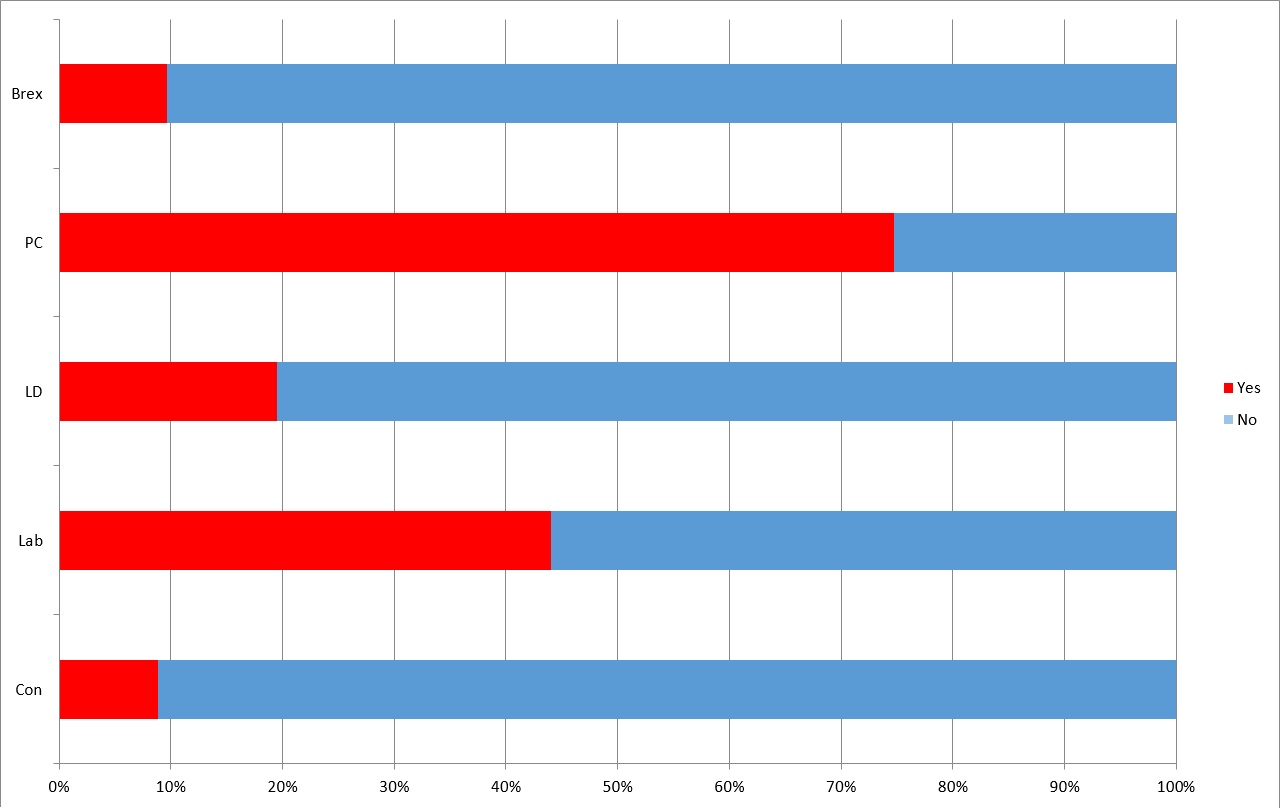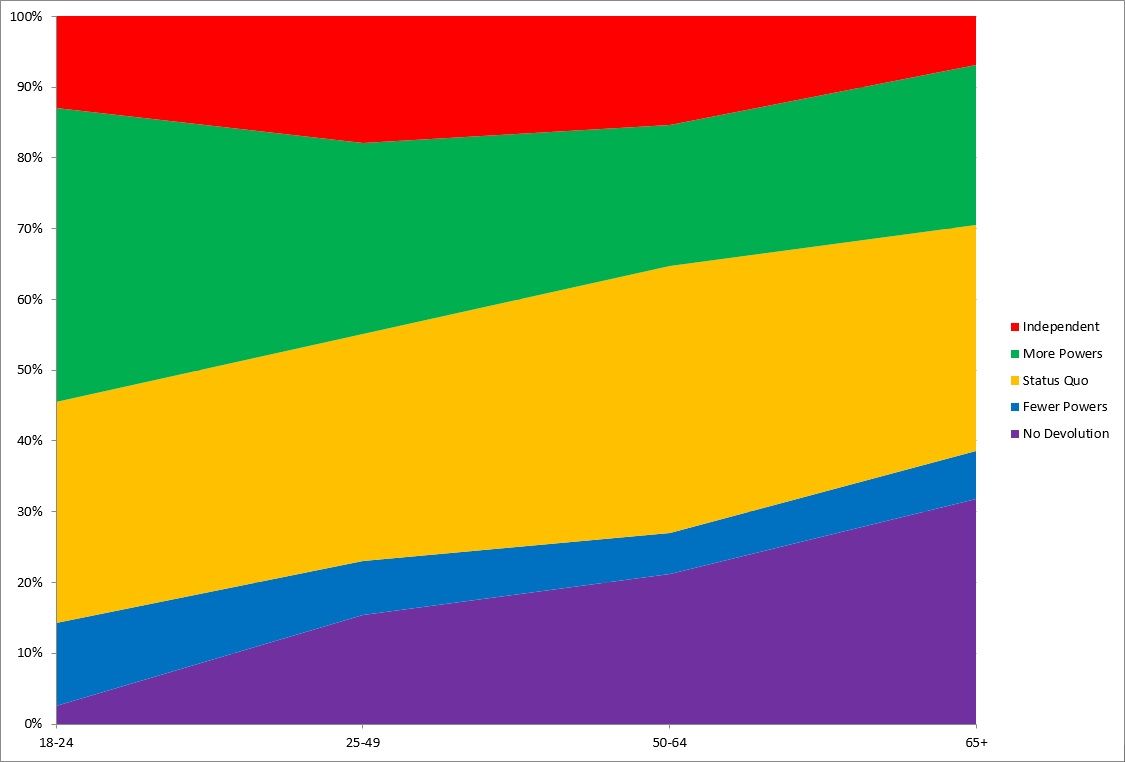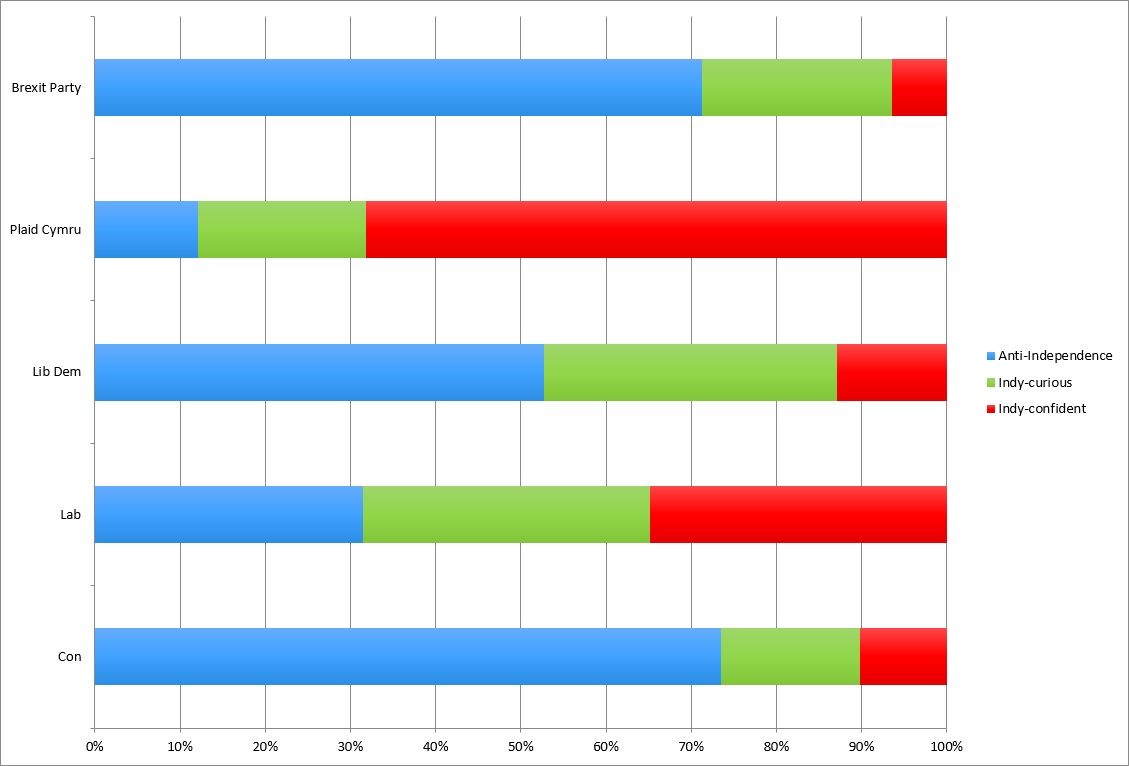What does the latest YouGov poll tell us about support for Welsh independence?

Dafydd Trystan
For some years a variety of polling questions have been asked of the Welsh electorate about independence, with responses ranging from under 5% support for Independence to over 40% of electors being open to independence.
These findings have been widely discussed with supporters and opponents alike welcoming the figures that most closely fit with their views.
However, the latest YouGov poll offers some clarity. It is an important poll as it asks all three versions of the ‘Independence question’ in the same questionnaire, to the same people.
So what does it tell us?
On the referendum question:
If there was a referendum tomorrow on Wales becoming an independent country and this was the question, how would you vote? Should Wales be an independent country?
28% say Yes, 72% No.
(14% Don’t Knows or Refused)
On the Constitutional Preference Question:
Thinking about the National Assembly for Wales, which of these statements comes closest to your view?
| There should be no devolved government in Wales | 17% |
| The National Assembly for Wales should have fewer powers | 6% |
| We should leave things as they are now | 27% |
| The National Assembly for Wales should have more powers | 21% |
| Wales should become independent, separate from the UK | 11% |
(18% of electors Don’t Know or Refused to answer)
And on the ‘indy-curiosity’ question (an 11 point Independence question):
On a scale of 0 to 10, where 0 is very strongly against and 10 is very strongly in favour, how do you feel about Welsh independence?
| Anti-Independence (0-3) | 48% |
| Indy-curious (4-6) | 30% |
| Indy-confident (7-10) | 23% |
(12% of electors Don’t Know or Refused to answer)
Having the three questions asked in the same poll allows us to consider the inter-relationship between the answers. Asking the same people, at the same time, we find a range of support from 11% to 28%.
We find that the Yes/No Referendum question elicits the highest support for independence, but even that figure potentially underestimates the potential support if one considers the data from the 0-10 scale question, where we find fully 53% of the electorate either indy-confident or indy-curious.
These data clearly suggest that while a majority of the Welsh electorate do not favour iWelsh independence today a significant minority are well disposed towards the idea.
Indy-confident
We can also delve deeper into the data by looking at the relationship between other variables and support (or not) for independence. When we consider party affiliation we find a very clear divide. Plaid voters are the most pro-independence (though even here we find almost a third in the ‘no’ camp). Labour voters, consistent with other polling in the past two years are more supportive that one might have imagined, over 40% of Labour voters would vote yes in a referendum. Rather unsurprisingly Conservative and Brexit Party voters are the most hostile.
Table One: Yes/No Independence By General Election 2019 Vote

Looking at constitutional preferences and age we find a striking pattern. For those under 50 years of age ‘No Devolution’ is the preference of a very small minority while younger voters clearly favour greater powers (around 50% of the under 50s). Amongst pensioners however ‘no devolution’ is one of the most favoured constitutional options (32%).
Table 2: Constitutional Preference By Age

Turning to the 0-10 scale, the picture in terms of party support is developed further. The vast majority of Brexit and Conservative voters are hostile to Independence. Equally unsurprisingly, Plaid voters are particularly indy-confident. Labour voters are possibly the most interesting group here, as they split almost equally three ways, 35% indy-confident, 34% indy-curious and 31% anti-independence.
Such data give greater context to the attention given by senior Labour figures, such as former First Minister, Carwyn Jones, to constitutional matters and the need to reform the United Kingdom. They also serve as a warning to those in Labour who might wish to dismiss support for independence as a fringe issue.
Table 3: Indycuriosity by Party

Impact
One final thought on the data – we can also consider the preferences of Remain and Leave voters. Here, we find a very clear distinction, though one which isn’t reflected, it seems, in the policy positions of Yes Cymru.
Remain voters are open to independence with fully 40% saying they would vote Yes in an Independence referendum. Leave voters are particularly hostile – with only 15% supporting Independence.
The result of the General Election and subsequent decisions on Brexit will have a significant impact on the debate on Welsh Independence, but in their most recent polling yougov, ITV and the Welsh Governance Centre have significantly enhanced our understanding of the views of the welsh electorate on these key debates.
The poll, for ITV-Cymru Wales and Cardiff University, had a sample of 1,136 Welsh adults and was carried out by YouGov from 31 October to 4 November 2019.
Support our Nation today
For the price of a cup of coffee a month you can help us create an independent, not-for-profit, national news service for the people of Wales, by the people of Wales.







“we can also consider the preferences of Remain and Leave voters. Here, we find a very clear distinction, though one which isn’t reflected, it seems, in the policy positions of Yes Cymru.” That’s an odd comment. YesCymru has a very simple policy position – we want independence for Cymru. That’s it. YesCymru has no policy position on the EU, NATO or the provision of more bus shelters in Llanfihangel Genau’r Glyn. All those are matters for the Cymry, through their political parties and elected Seneddwyr to decide, once we have decided to become independent. YesCymru is for ALL who want… Read more »
Correct Nigel! Yes Cymru is campaigning for independence, nothing more, nothing less. We all have different views on all aspects of life but agree on this single, clear aim.
The Daroganau said that we will lose all Britain except Gwynedd before the tide turns. We hold Ynys Mon and Gwynedd yet.
We will lose Ynys Mon before the tide turns in favour of the Britons.
Despite the recent experience with polls the wordsmiths and chatterers are out there drawing all sorts of conclusions . The same people will tell us the day after the results why the polls were so far adrift especially in these troubled mixed up times. The only way to secure any kind of positive outcome is to get a clear articulate message and plenty of people on the ground to communicate it. For the wordsmiths that is too much like hard work, and the chatterers prefer the echo chamber of their own kind.
It is that disrespect for other people’s views that will help support for independence to grow. It is not that the “noisy minority” are getting louder it is that there’s more of us,
Welsh independence is nothing more than digital hysteria and autistic intellectual masturbation.
I wish it weren’t so.
“Should Wales be an independent country?
28% say Yes, 72% No.
(14% Don’t Knows or Refused)”
How does this add up?
The poll seems to present two contrasting findings (although these are in no way contradictory): 1. A majority of those supporting independence in a yes/no question would actually prefer some kind of devolution if they were given the choice. 2. A majority of those who favour greater powers for Wales (and possibly even a few of those who favour things the way they are) would support independence in a yes/no vote. To speculate further, could it also suggest an apparent increase in the emotional appeal of independence, but that this is not reflected in terms of its popularity as a… Read more »
It is noticeable how conservative with a small ‘c’ are nearly all the age groups. The number of 18-24 year olds preferring the status quo is not much smaller than the number of people over 65 preferring the same. Understandably older voters are keener on the status quo ante 1999 whereas for younger voters that means going back to ‘the past’ not to the system they once knew. Considering the fact that UK Government has been suffering from a complete breakdown over the past three and a half years, it is incredible that figures for independence and more powers aren’t… Read more »
Why the older population tend to be more anti-independence may be down to those looking towards retirement and the UK state pension. This is an aspect we must consider. the population are forced to pay into the Uk state pension scheme. What happens when Wales does go independent and particularly if England (the remaining UK nation) is outside the EU customs union – then state pensions are frozen. Alsom, the option that exist in the private schemes of a transfer value simply does not exist in the UK state scheme as it is a pyramid scheme funded by new contributors.… Read more »
Things that may move minds; Poor economic performance as result of Brexit .
Effect of a United Ireland . Effect of Independent Scotland. Death of Queen.
Growing power of the European Union, as a result of Brexit and Macron’s centralism.
Stronger European Union economic ties with Russia.
Any or all of these will gnaw away at confidence of Brit. Nats.
I’m a UK based foreign correspondent. On a recent reporting trip to Wales with a colleague on the topic of the Yes Cymru campaign and Brexit we were pointed towards this blog. It’s fine, however the author is inconsistent it seems to me with what he uses as the ground base for his figures. In the binary question (“If there was a ref tomorrow on Wales becoming independent how would you vote, yes or no?”) he discards the Don’t Knows, which allows him to get to a high 28% of Yes voters. This, unsurprisingly, was the figure Plaid Cymru /… Read more »